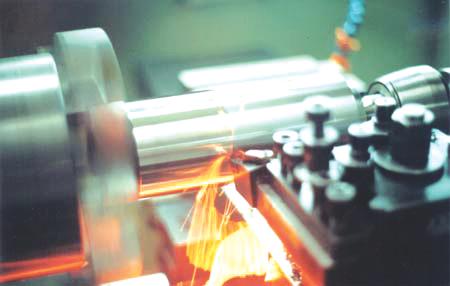The Computer-Integrated Machining curricu-lum at Fayetteville Technical Community College is designed to prepare students for a career in manufacturing by providing them with the skills required to enter into various machining positions. We emphasize all aspects of machining that are required to take a product from the initial design to the final product. To accomplish this, we utilize a wide variety of metalworking equipment that in-cludes manual and computerized machines, such as drill presses, lathes, and milling machines. We also have a new computerized EDM (electrical dis-charge machine) that cuts extremely precise, com-plex geometry without ever touching the part. The operation is accomplished by using fine sparks that jump from a brass wire to the product to burn the material out of the cut.
In general, a machinist is a skilled craftsman who uses machine tools to manufacture parts from various materials. These parts can be one-of-a-kind parts used in special ap-plications or numerous parts used in a high-volume production operation. To understand how a machinist impacts your daily life, we need to understand what a machinist produces. Production machinists produce multiples of parts used in production requirements. Specialized machinists include mold makers who produce molds used to manufacture plastic or die cast parts, die makers who pro-duce stamping dies that cut and form sheet metal parts, and general machinists who produce almost any product needed. One of the best examples of a machinist’s work is a car. The panels that form the shape of a car are typically stamped from dies. The plastic components, such as the grill, lights, hub caps, dashboard and console, are produced from molds. The engine, transmission, axles, wheels, and various other parts are made by production machinists.
In order to properly produce a part, a machinist must also be able to read blueprints, interpret the geometry and specifications, select the proper tools and processes, and use all the necessary machines and gages required. A machinist must also be able to manufacture precise parts. In our training, we manufacture parts to tolerances of ±.0002 of an inch (approximately 1/20th of a human hair). To meet these require-ments, we include classes in blueprint reading, general math, geometry, trigonometry, metallurgy (the properties of metals) and metrology (the study of measurements). Since computers have become such a vital part of manufacturing, we also teach classes in CNC, CAD and CAM. CNC (computer numerical control) is the computer interface that allows a machinist to write a computer program that controls the movements of a machine. CAD (computer aided design) is software that allows the design of products through a specialized computer program. CAM (computer aided machining) is software that allows a machinist to take a CAD drawing or model and generate the CNC code for a machine to produce the part. 
Although the field of more than 400,000 machinists is expected to remain steady, job prospects are expected to grow as more machinists retire or change careers than new candidates enter the field. As with many fields, the pay varies widely, with the typical starting pay for a machinist ranging from $14-$18 an hour and a top pay that can exceed $25 an hour.
Come and see how you can begin a rewarding career in this highly technical and challenging field and visit our state-of-the-art lab facility at Fayetteville Technical Community College. For more information, please contact Gary Smith, program coordinator, at 678-8375.
Photo: Although the field of more than 400,000 machinists is expected to remain steady, job prospects are expected to grow as more machinists retire or change careers than new candidates enter the field.